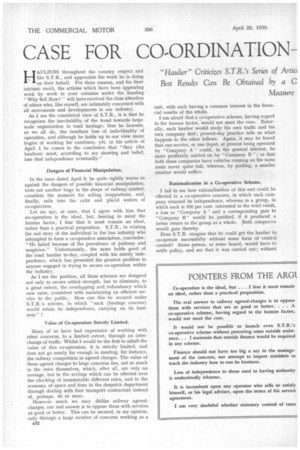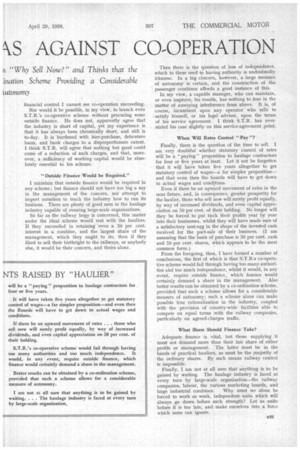CASE FOR CO-ORDINATION kS AGAINST CO-OPERATION
Page 42

Page 43

If you've noticed an error in this article please click here to report it so we can fix it.
"Haulier" Criticizes S.T.R.'s Series of Artio Best Results Can Be Obtained by a C a "Why Sell Now?" and Thinks that the ination Scheme Providing a Considerable Lutonomy H. AULIERS throughout the country respect and like S.T.R., and appreciate the work he is doing on their behalf. For these reasons, and for their intrinsic merit, the articles which have been appearing week by week in your columns under the heading " Why Sell Now ? "will have received the close attention of others who, like myself, are intimately concerned with all movements and developments in our industry.
As I see the considered view of S.T.R., it is that he recognizes the inevitability of the trend towards largescale organization in road haulage ; that he laments, as we all do, the resultant loss of individuality of operation, and although he holds up to our view many bogies of working for combines, yet, in his article of April 1 he comes to the conclusion that "they (the hauliers) must, according to my showing and belief, lose that independence eventually."
Dangers of Financial Manipulation.
In the issue dated April 8, he quite rightly warns us against the dangers of possible financial manipulation, trots out another bogy in the shape of railway control, considers the moment for selling inopportune, and, finally, sails into the calm and placid waters of co-operation.
Let me s,ay, at once, that I agree with him that co-operation is the ideal, but, bearing in mind the human factor, I fear that it must remain an ideal, rather than a practical proposition. S.T.R., in relating the sad story of the individual in the bus industry who attempted to form a co-operative association, concludes:
He failed because of the prevalence of jealousy and suspicion." Unfortunately, the same holds good of the road haulier to-day, coupled with his sturdy independence, which has presented the greatest problem to anyone engaged in trying to secure co-operation within the industry.
As I see the position, all these schemes are designed not only to secure added strength, but to eliminate, to a great extent, the overlapping and redundancy which now exist, consistent with maintaining an efficient service to the public. How can this be secured under S.T.R. 's scheme, in which "each (haulage concern) would retain its independence, carrying on its business' ?
Value of Co-operation Strictly Limited.
Many of us have had experience of working with other concerns, to a limited extent, through an interchange of traffic. Whilst I would be the first to admit the value of this co-operation, it is strictly limited, and does not go nearly far enough in meeting, for instance, the railway competition in agreed charges. The value of these agreed charges to large concerns lies, not so much in the rates themselves, which, after all, are only an average, but in the savings which can be effected over the checking of innumerable different rates, and in the economy of space and time in the despatch department through dealing with four transport contractors instead of, perhaps, 40 or more.
However much we may dislike railway agreedcharges, our real answer is to oppose them with services as good or better. This can be secured, in my opinion, only through a large number of concerns working as a B52 unit, with each having a common interest in the financial results of the whole.
I am afraid that a co-operative scheme; having regard to the human factor, would not meet the case. Naturally, each haulier would study his own traffic and his own company first; present-day practice tells us what happens to the other fellows. Again, it may be found that one service, or one depot, at present being operated by "Company A" could, in the general interest, be more profitably carried on by "Company B " ; or that both these companies have vehicles running on the same route never quite full, whereas, by pooling, a smaller number would suffice.
Rationalization in a Co-operative Scheme.
I fail to see how rationalization of this sort could. be effected in a co-operative concern, in which each company retained its independence, whereas in a group, in which each is 100 per cent. interested in the total result, a loss to "Company A" and a corresponding gain to "Company B" would be justified, if it produced a better return to the group as a whole. Both companies would gain thereby.
Does S.T.R, imagine that he could get the haulier to co-operate successfully without some form of central control? Some person. or some board, would have to settle policy, and see that it was carried out; without financial control I cannot see co-operation succeeding.
Nor would it be possible, in my view, to launch even S.T.R.'s co-operative scheme without procuring some outside finance. He does not, apparently agree that the industry is short of capital, yet my experience is that it has always been chronically short, and still is to-day. It is burdened with hire-purchase, debenture loans, and bank charges to a disproportionate extent. I think S.T.R. will agree that nothing but good could come of a reduction of such charges, and that, moreover, a sufficiency of working capital would be absolutely essential to his scheme.
"Outside Finance Would be Required."
I maintain that outside finance would be required in any scheme ; but finance should not have too big a say in the management of the concern, nor attempt to import outsiders to teach the industry how to run its business. There are plenty of good men in the haulage industry capable of running large-scale organizations.
So far as the railway bogy is concerned, this matter under the ideal scheme would rest with the hauliers. If they succeeded in retaining 'even a 50 per cent. interest in a combine, and the largest share of the management, which they ought to do, then if they liked to sell their birthright to the railways, or anybody else, it would be their concern, and theirs alone. Then there is the question of loss of independence, which to those used to having authority is undoubtedly irksome. In a big cOncern, however, a large measure of autonomy is certain, and the construction of the passenger combines affords a good instance of this.
In my view, a capable manager, who can maintain, or even improve, his results, has nothing to fear in the matter of annoying interference from above. It is, of course, incumbent upon any operator who sells to satisfy himself, or his legal adviser, upon the terms of his service agreement. I think S.T.R. has over
. stated his case slightly on this service-agreement point.
When Will Rates Control " Pay "?
Finally, there is the question of the time to sell. I am very doubtful whether statutory control of rates will be a "paying" proposition to haulage contractors for four or five years at least. Let it not be forgotten that it will have taken five years altogether to get statutory control of wages—a far simpler proposition— and that even then the boards will have to get down to actual wages and conditions.
Even if there be an upward movement of rates in the near future, and, in consequence, greater prosperity for the haulier, those who sell now will surely profit equally, by way of increased dividends, and even capital appreciation on 50 per cent, of their holding. No longer will they be forced to put back their profits year by year into their businesses, whilst they will have made sure of a satisfactory nest-egg in the shape of the invested cash received for the part-sale of their business. (I am assuming that the basis of purchase is 50 per cent, cash and 50 per cent. shams, which appears to be the most common form.) From the foregoing, then, I have formed a number of conclusions, the first of which is that S.T.R.s co-operative scheme would fail through having too many authorities and too much independence, whilst it would, in any event, require outside finance, which finance would certainly demand a share in the management. Also better results can be obtained by a co-ordination scheme, provided that such a scheme allows for a considerable measure of autonomy; such a scheme alone can make possible true rationalization in the industry, coupled with the provision of country-wide facilities able to compete on equal terms with the railway companies, particularly on agreed-charges traffic.
What Share Should Finance Take?
Adequate finance is vital, but those supplying it must not demand more than their fair share of either profits or management. The latter must be in the hands of practical hauliers, as must be the majority of the ordinary shares. By such means railway control is impossible.
Finally, I am not at all sure that anything is to be gained by waiting. The haulage industry is faced at every turn by large-scale organization—the railway companies, labour, the various marketing boards, and huge industrial combines. Why must we alone be forced to work as weak, independent units which will always go down before such strength? Let us unite before it is too late, and make ourselves into a force which none can ignore.






















































































